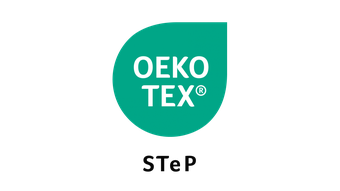sustainability
As a company, we want to contribute to an economy that respects the planet's boundaries and guarantees basic social rights. We want to take this responsibility by systematically including ecological, social, and economic considerations in our daily policy.
the arx initiative
The arx initiative is our way of taking responsibility for the impact we have on the environment, by actively reducing our impacts whilst extending the lifetime of our products.

Sustainability
design and production
We design and produce our clothing in our own production locations in Belgium, the UK, Spain, Czech Republic, Tunisia, Morocco, Laos and Madagascar.
We screen these production units internally, of course, but we also have them checked by external parties. All clothing is designed according to the principle of ecodesign. But we always start from the needs of the wearer to guarantee the longest possible use.
We strive to reuse by building in repairability through smart confection, we strive to use fabrics that can be recycled into fibres again. We use Oekotex-100 certified fabrics, which do not contain any harmful chemicals.
People, planet and profitability… these are one and the same fight.

Sustainability
restoring eco-systems
Every year we measure the CO2 footprint of the entire production chain (scope 1, 2 AND 3).
The first goal is to reduce emissions by using fabrics that have overall lower emissions (like Alsiflex), switching to low-emission transport, and switching to 100% renewable energy in production. In addition, we are planning to biodiverse ‘green dots’ in each of our production locations.
Also, we compensate for the emissions caused by the production of our own collection and transport through a tree planting program. It is an in-setting program, in which we will plant trees that act as effective carbon sinks. The native species help to restore ecosystems that are severely affected by erosion. Planting is done with the help of the local population, who receive yield trees such as coffee, cocoa, or lychee to be able to do a more sustainable type of agriculture.
We compensate emissions caused by production through a tree planting programme.


Sustainability
our goal
To become Net Zero+ by 2040
How alsico group is contributing to global sustainability?
1. Being overtly ambitious
With climate and biodiversity crises biting, and menacing the livelihoods around the globe, we know this is only possible when it comes with the strongest of ambitions. That is why the alsico group, has chosen to aim for two very clear, but immensely ambitious sustainability goals for the year 2040:

Net zero+ has to lead to a reduction of 90% of CO2e emissions compared to the base year 2022. Tools we will put in place: a yearly GHG emissions accounting and report, a net zero plan verified by the science-based targets initiative, and an environmental due diligence assessment tool on the whole supply chain.
Two of the 7 SMART-subgoals will be major drivers to reach net zero:
- 100% of our products shall be eco-designed aiming at maximum lifespan, repairability, and recyclability
- 100% of our raw materials shall comply with our preferred inputs list (compliant with the ZDHC roadmap to zero, maximal microfiber reduction, no fossil fuel-based fibers, recyclable fibers, cotton sourcing from 3rd party verified sustainable sourcing programs)

Living wage+ aims at continuous monitoring of living wage at all alsico locations, closing existing gaps between paid and living wage in a timely manner and in agreement with local stakeholders.
Tools we will put in place:
A Living Wage Calculator (based on the Anker methodology) for each alsico location, a social and human rights due diligence assessment tool on the whole supply chain. We have 5 subgoals ranging from a hardship fund for our employees that allows them to weather unexpected situations with severe financial impact, to gender equality, including leadership programs and special protection of young employees.

2. Reporting on environmental, social and governance (ESG) impacts on all the units
For the very first time, alsico group reports on the ESG impacts of all its locations. We gather data on our 17 units, business as well as production units. Including diversity and employment data on people who work at our company.
But also energy and material consumption and a complete and externally verified Greenhouse Gas (GHG) emissions report.
With the data collected from all 17 units, we were able to calculate direct emissions (scope 1), indirect emissions from electricity purchase (scope 2) and all other indirect emissions from non-owned production means (scope 3).
This gives us a base year against which we will measure our future improvements.
We will keep track of progress by publishing a yearly GHG emission report.
Since we committed to the science-based target initiative, we will have our GHG-reduction plans verified and followed up by SBTi.

Adding to that, we strive to have our processes verified in the context of external audits/assessments like Oeko-tex STeP.
We will recur to the highest standards for health and safety, environmental impact, social responsibility, and quality management. By monitoring this powerful improvement cycle we can ensure we will achieve our objectives.

As a part of the larger effort, alsico group partners with Better Cotton to improve cotton farming globally.
A member of the Better Cotton since 2021, alsico group aims to source all its fibres in a sustainable way by the end of this decade. As part of this effort, we are committed to sourcing 100% of our cotton as ‘more sustainable cotton’ by 2030. ‘More sustainable cotton’ includes recycled cotton, organic cotton, cotton sourced from Fairtrade or through Better Cotton.

the alsico academy
The alsico academy’s purpose -its ‘raison d’être’- is to lead the way to a better future.
The fundamental mission of the alsico academy is to pioneer the way towards a more promising future for the professional clothing industry.
Our 'raison d'être' is centered around fostering a sustainable future, envisioning functional garments that not only guarantee your safety but also provide comfort. Our commitment lies in making conscientious choices that prioritize the well-being of both our planet and your health. We advocate for a departure from practices that contribute to pollution and reliance on fossil fuels; instead championing the cultivation of robust ecosystems and thriving communities.
We exist to lead the way to a better future.

latest sustainability stories
)







